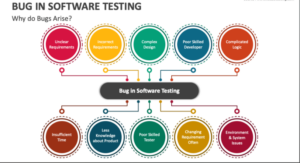Introduction
Embarking on a career as a QA tester in Quality Assurance (QA) can be exciting, but it’s also filled with challenges and learning opportunities. Understanding what the field entails will help you navigate your journey more effectively and set realistic expectations.
Here are some key things you should know before stepping into the world of QA testing.
Understand the Role of a QA Tester
- QA testers are responsible for ensuring software meets specified requirements and is free of defects.
- Your job isn’t just about finding bugs but also about improving the quality of the product.
- You’ll collaborate with developers, product managers, and other team members to deliver a seamless user experience.
Know the Difference Between Manual and Automated Testing
- Manual testing involves testing software without the use of automation tools, requiring a QA tester to have a keen eye and a meticulous approach to identify issues and ensure the software functions as intended.
- Automated testing uses tools like Selenium or JIRA to execute tests and is essential for repetitive and time-consuming tasks.
- Understanding when to use manual versus automated testing is crucial for a successful QA tester career, as it helps in selecting the most efficient and effective approach to ensure software quality based on project requirements and testing needs.
Familiarize Yourself with QA Processes and Methodologies
- QA testing isn’t just about executing tests it’s a process.
- Learn software development life cycles (SDLC), agile methodologies, and testing frameworks.
- Familiarity with these processes will help you communicate effectively with your team and understand your role in the bigger picture.
Master Key QA Testing Tools
- As a beginner, learning tools like Selenium, Postman, JIRA, and LoadRunner will give you an edge.
- Tools vary depending on the company and project, so being adaptable and quick to learn is important.
- Hands-on experience with these tools is often a requirement for QA roles.
Cultivate a Detail-Oriented Mindset
- QA testing demands a high level of attention to detail.
- You’ll need to spot issues others may overlook, which requires patience and perseverance.
- Developing a meticulous and methodical approach to your work is key to excelling in this field.
Be Prepared to Learn and Adapt Constantly
- Technology is always evolving, and so are the tools and practices in QA testing.
- Stay updated with the latest trends, frameworks, and tools to remain competitive.
- Enroll in training programs, attend workshops, or participate in online communities to expand your knowledge.
Understand the Challenges of a QA Career
- QA testing can be repetitive, requiring a consistent focus over long periods.
- Deadlines can be tight, and managing workload while maintaining quality can be stressful.
- Knowing these challenges in advance helps you, as a QA tester, build resilience and prepare mentally for the demands of the job
Develop Strong Communication Skills
- QA testers often need to report issues and work with other teams to resolve them.
- Clear and concise communication ensures bugs are documented properly and fixes are implemented effectively.
- Building good relationships with your team is essential for smooth workflows.
Set Realistic Career Expectations
- QA testing is an excellent career choice with room for growth, but it may take time to climb the ladder.
- Entry-level roles might focus more on repetitive tasks, but as you gain experience, you can move into roles like automation engineer, QA lead, or even product management.
- Being patient and setting achievable goals will help you succeed in the long term.
There are numerous lesser-known aspects of a career in Quality Assurance (QA) that many beginners may not be aware of. These insights can make a significant difference in preparing aspiring testers for what lies ahead. Entering the QA field as a QA tester can be both exciting and challenging, but understanding the nuances of the profession ensures you’ll face fewer surprises and avoid unnecessary discouragement along the way, allowing you to approach each task with confidence and clarity.
For those new to QA, having a clear picture of the career path, expectations, and skills required will not only boost your confidence but also help you set realistic goals. Whether you’re just starting as a QA tester or considering QA as your career, this article will provide valuable insights into what the field entails, the challenges you might encounter, and the opportunities it offers, helping you make informed decisions as you embark on your professional journey.
By equipping yourself with this knowledge, you can lay a strong foundation for a successful and fulfilling career in quality assurance.
Essential skills and knowledge every aspiring QA tester should acquire to succeed in their career
Enroll in a quality assurance course
The first thing you need to know before starting a quality assurance career is to enroll in a Quality assurance tester course. There are tons of quality assurance courses you can get to learn what the roles and responsibilities are about. Most jobs in quality assurance require a minimum of certification in the course after a related degree to remain a competitive candidate.
With this as well, you need to learn how to work towards the particular requirements for your dream company. The statistics are available online so research them to get what you need for the job.
An internship works in kickstarting your career
As soon as you complete your course, the next thing is getting a job as a QA tester, right? While a job is very important because of the additional pay, an internship is a basic level you can consider. Although it’s not always paid, the experience gathered is worth everything.
Internships are quite flexible, some lasting months, others years, but always find out the requirements before picking one. In other words, research the company to list out your top interests in the industry. It helps a lot and it’s one of the things you need to know before starting a quality assurance career.
You need soft skills
In addition to the educational requirements, you need to develop soft skills. These are very important to help you continue and advance in your career. First, you need maximum attention to detail. Quality assurance testing requires lots of detailing during the process, especially for documentation activity.
Your organizational skills are also very necessary in this regard because they’ll help you create structure and order. Also, it’ll increase the productivity and efficiency of your work.
Problem-solving skills are quite essential for a QA tester too. Testers are experts trained to search for and identify problems and bugs in a software system. The development of your problem-solving skills will help you become the best QA tester in your field, ensuring that you can tackle complex issues with ease.
Learn the tools of the trade
It’s important to also learn the tools of quality assurance testing. These include but are not limited to Selenium, Zoho, etc. You need to learn about these tools as you enroll in the quality assurance certification courses. It will help you familiarize yourself and understand the processes of working with these tools better.
Get a mentor
Another tip you need to know before becoming a quality assurance tester is getting a mentor. Your mentor should be an experienced tester that has an advanced understanding of the whole process. Getting a mentor as a QA tester can be from your certification class or by attending seminars and workshops. In all, ensure you have someone to guide you through the nuances of the profession, offering insights and advice to help you grow and succeed in your career as a QA tester.
Try out freelancing jobs
A quality assurance tester can also be a freelancer. So, try out freelancing jobs you can get anywhere on online sites. These will come in handy when trying to get an extra source of income during or after your course.
Quality assurance isn’t for the lazy ones
Unlike the general notion everyone has about the testing process, it’s the other way round when you get into the job. The quality assurance process has lots of stages and responsibilities attached to it. So, be prepared to work and perform your duties accurately. You need to understand programming languages, and how to write test scripts and build them in a server environment.
Understanding your client’s needs is important
Just like any other profession, it’s important to understand the goals of the software before starting. The perfect definition of these goals will help you perform the testing process more effectively as well as get them free from bugs after checking the end use.
Learning never ends
As you get into the quality assurance online course, you need to know that learning never ends. You should keep learning and adding knowledge periodically to maintain your career growth.
Enroll for courses in stages as a QA tester as you go; it’ll help you become better and continuously upgrade your knowledge. This step-by-step approach ensures that you stay updated with the latest testing techniques and tools, ultimately making you a more proficient and valuable QA tester.
Conclusion
A quality assurance tester is a professional who wears many hats, from ensuring software functionality to maintaining product standards. The role requires a diverse skill set, attention to detail, and the ability to adapt to changing technologies.
Before diving into this exciting and rewarding career, the tips and insights we’ve discussed are essential for preparing your mindset and setting realistic expectations. Understanding the challenges and growth opportunities within QA testing will help you navigate the field with confidence and clarity. Get started today by joining an Quality assurance software testing courses.

































One Response